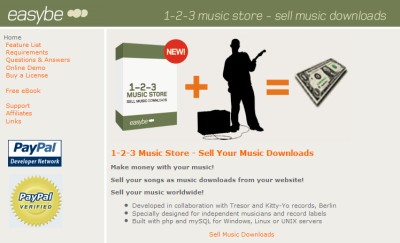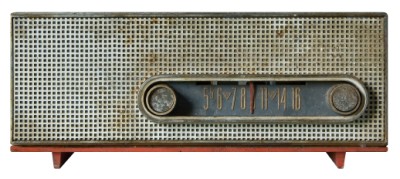 September 13, 2009
September 13, 2009 Not your average promo idea.
As soon as the band Palomine has collected video messages from every country in the world, they will officially release their new album “Attention Alpha”.

 September 13, 2009
September 13, 2009 As soon as the band Palomine has collected video messages from every country in the world, they will officially release their new album “Attention Alpha”.
 August 30, 2009
August 30, 2009 I’m a Coldplay fan.
So before Vida La Vida/Death and all His Friends was released, I wanted to hear some tracks. I saw the apple commercial for Vida la Vida and thought there may be a live version of the whole song somewhere on YouTube. I didn’t find an official live version, but I did stumble on a cover by this band called Boyce Avenue.
I was impressed that they had learned the song before it was officially released because they knew Coldplay fans would be searching for it. I took a look at more of their videos and realized they were covering nearly every top 40 song there was. These covers were all generating over a million views
 August 29, 2009
August 29, 2009 Musicians spend too much time entering their data on multiple websites. Filling out forms. Uploading MP3s. Uploading photos. Entering dates and venues into concert calendars. Pasting lyrics and bio. All those stupid profiles scattered around the web, which of course will soon be outdated unless they’re constantly updated.
Some outside sites say, “We’ll manage all your data!” - but I don’t want to go to yet-another-website to enter all of my data, and trust them not to go out of business. In fact, I don’t want to enter my info anywhere but my own website!
So, I think the musician’s own “.com” homepage website should be the one-and-only place the musician ever has to enter their info. It should be the sole definitive source for their music, photos, bio, lyrics, calendar, blog, and especially their fan/friend/email list.
Then it’s the web hosting company’s job to spread that info other sites.
 August 24, 2009
August 24, 2009 Networking sites are great promotional tools. Everyone from the indie artist to the artist who has a massive advertising and marketing budget has one. But when is it time for house cleaning? When is it time for certain things to go away? A good deal of what is posted is unimportant, boring and, let’s face it, stupid. Now, if you’re just another face on Facebook or Twitter, it doesn’t really matter. However, if you are an artist, a band or someone who is trying to promote and market, those little stupid updates can harm you more than help you.
So what is the answer?
Simple. Do some housecleaning now and then and make sure you are providing the information, the image and the promotional materials that will reach the most people in the best way. Be smart in a world of social networking. Twittering, face booking and whatever other term you can come up with where people are putting out the dumbest information that might only apply to the fewest people and end up causing the most problems and over all disinterest possible.
 August 5, 2009
August 5, 2009 I have never seen something that you can’t get (in the states) that has received so much positive attention. What gives? Is Spotify that great? Does Spotify matter to artists? Is it game-changing for the industry? Is there room for five more companies just like it? How are new songs discovered on Spotify?
Thanks in advance for the comments.
 July 30, 2009
July 30, 2009 
I get at least one phone call per week asking about my experience with the 1-2-3 Music Store, a server script I’ve been running for three years. It allows me to sell mp3 downloads direct from my web site, with no middleman. Put simply, the 1-2-3 Music Store is the ugly stepsister of the iTunes Store. She may not be beautiful, but she’s all mine.
 July 20, 2009
July 20, 2009 Your website, your Facebook page, your music sample sites and anywhere else fans can find you should have all your key marketing and promotional content, but when does it get old and is it time to update? Remember, while you are chasing after the new fans, it is important to maintain the established ones as well. You have to think about what is going to draw someone to your website and why they are going to stay interested in going back to visit again and again. Unfortunately, way too many artists have very sharp websites that are only updated with gigs or with updates that are quick, pointless blurbs that are not all newsworthy. You have to separate from the pack.
 July 15, 2009
July 15, 2009 With the influx of so many social networking sites, and ways to start conversations online it’s sometimes hard to understand what it all means and how it’s helping your music career.
This week I’ve come across some great sites that break down your Social Media Buzz. These sites can give you actual hard numbers/metrics and reports on how you are getting a return in your investment of time online.
 July 1, 2009
July 1, 2009 If you like looking at really well done sites that feature music or music related stuff, you have to see Tyler Thompson’s page featuring Miles Davis Album Art. Great design work!
NEWTOYORK was created using SquareSpace. Here’s the link to the hack that tells you how to recreate this page.
 June 25, 2009
June 25, 2009 I’ve written “what artists should know” articles on Last.fm, Jango, and thesixtyone, but after months of casual participation, I can’t seem to get anywhere on Stereofame. Rather than bore you with my less than noteworthy experience, I turned to the undisputed kings of the site, Temple Scene. Philippe Rose and Ric Levy make phenomenal electronica-tinged pop, but we all know it takes more than great music to get heard. Ric shares his experience and advice below.
 May 29, 2009
May 29, 2009 thesixtyone is quite simply my favorite music site, both as a listener and and artist. Billing itself as “a music adventure,” t61 is like a massively multiplayer game, complete with reputation points, levels, quests, and achievements. It’s a fun way to discover and be discovered. The rules are constantly in flux, so I’ll omit the fine details and walk you through the broad strokes of establishing yourself as an artist.
 May 8, 2009
May 8, 2009 
My last article on Jango sparked spirited discussions on the Just Plain Folks and CD Baby forums, and in the comments. Words like “scam” and “payola” are recklessly thrown about. We need to dispel these unfair and inflammatory accusations before we can have an honest debate.
Is it a scam?
Absolutely not! It is a service that delivers everything it promises. Jango sells airplay, not results. To put it in perspective, I’ve spent $4,000 on Taxi since becoming a member in 1997. I’ve had over 100 forwards, but no deals. I’ve spent $7,000 on traditional radio promotion, with literally nothing to show for it. That doesn’t mean that Taxi and traditional radio promotion are scams. They just haven’t been effective (YMMV).
Is it payola?
 May 4, 2009
May 4, 2009 Would you pay $1 for a new fan? Would you pay 2 cents to have your song played to a fan of your favorite band? I would, and did, with Jango Airplay. Jango offers free internet radio that plays listener-selected artists alongside similar artists. Tell it which artists and songs you like and dislike, and it adjusts accordingly. Basic social networking features are included, allowing listeners to share music and compare tastes. Jango Airplay lets artists buy their way into Jango’s recommendation engine, promising guaranteed airplay alongside your pick of popular artists. You can buy 1000 plays for $30, 2000 plays for $50, or 5000 plays for $100. I started with 5000 plays, and was so encouraged by the results that I spent another $200 for 10,000 more.
 April 30, 2009
April 30, 2009 Being a musician these days can be wonderful as well as a daunting - there are so many opportunities out there (especially on the web) to distribute your music, it can be very easy to forget what the ultimate goal is - to acquire new fans!
That being said, many musicians are not very business or tech savvy and can get lost in all the networks and tools everyone is raging about. Should I concentrate on MySpace? WTF is Twitter? How can I get on iTunes?
While all of those tools are wonderful opportunities for musicians to connect with their potential audience, they are just tools, and not a means to building something that’s long term; you need to use them, but your ultimate goal should be to use those tools to get new fans to come to YOUR own website.
Why is your site so important? Isn’t it just the same as a MySpace page?
Recent Popular Content
(Updated January 13, 2016)

